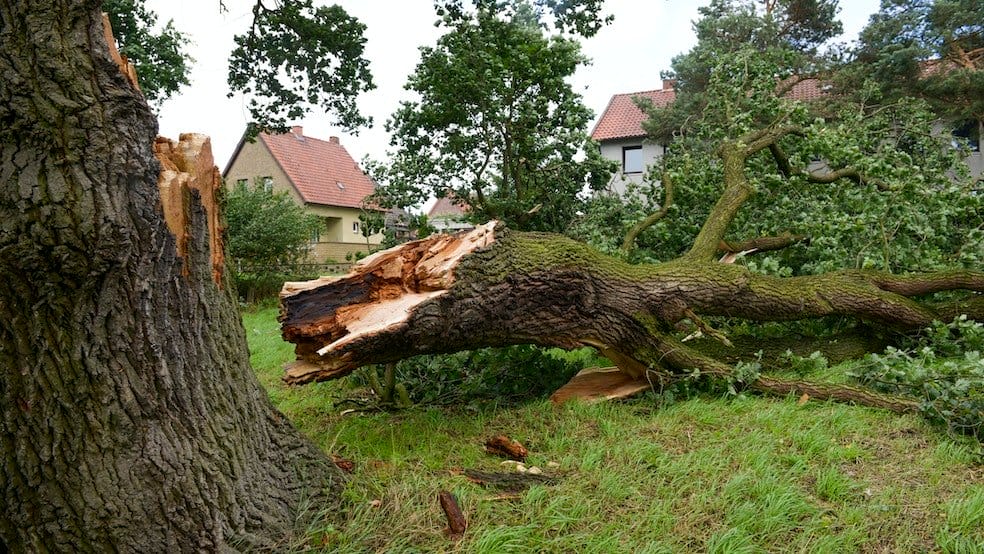
Storm Damage Repair and Cleanup: Essential Steps to Restore Your Property
Storm damage can cause significant destruction to your home or business, leaving behind a trail of debris and potential hazards. From hurricanes and tornadoes to hailstorms and floods, severe weather can wreak havoc on your property. It is crucial to understand the impact of storms on your property, the importance of addressing storm damage promptly, and the common types of damage caused by storms.
At Keystone Industries, we provide swift and reliable storm damage clean-up services. Our team is experienced in efficiently addressing post-storm debris and ensuring your property is safe and clear. With a quick response, safety protocols, and efficient debris removal, we restore your property’s safety and appearance. Trust us to handle storm-related challenges with expertise and care. Contact us for prompt assistance in storm damage clean-up. Don’t forget to check out our Land Clearing Services


What is storm damage and why is cleanup necessary?
Understanding the impact of storms on your property
Storms, such as hurricanes and tornadoes, can cause severe damage to your property. Strong winds can uproot trees, tear off roofs, and shatter windows, while heavy rain can lead to flooding and water damage. Understanding the potential impact of storms can help you prepare for the aftermath and minimize the damage.
The importance of addressing storm damage promptly
Failing to address storm damage promptly can exacerbate the problem and lead to further damage. Water damage, for instance, can quickly lead to mold growth, which can be hazardous to your health. Prompt cleanup and restoration are essential to prevent further deterioration of your property.
Common types of damage caused by storms
Storms can cause a wide range of damage, including structural damage, water damage, and fire damage. Structural damage includes roof leakage, damaged walls, and compromised foundations. Water damage, on the other hand, can result from flooding or leaks in the plumbing system. Fire damage may occur if storms cause electrical malfunctions or if lightning strikes your property.

What are the specific challenges associated with storm cleanup?
Dealing with debris removal and disposal
Debris removal is a crucial part of storm cleanup. Fallen trees, broken branches, and other debris can obstruct roads, damage buildings, and pose safety hazards. Professionals equipped with the necessary tools and equipment can efficiently remove the debris and ensure proper disposal.
Addressing water damage and mold growth
Water damage is a common consequence of storms, especially those involving heavy rainfall or flooding. Excess water can seep into walls, floors, and furniture, leading to mold growth and structural damage. Prompt water extraction and drying are essential to prevent further issues.
Handling smoke and fire damage caused by storms
Storms can also cause smoke and fire damage, either directly or indirectly. Lightning strikes, electrical malfunctions, or downed power lines can result in fires that damage your property. Professionals trained in fire damage restoration can handle the cleanup and repair of fire-damaged areas.
How to protect your property from future storms?
Preparing your property for a potential storm
Proper preparation is key to protecting your property from storm damage. Trim branches that pose a risk to your house or power lines, secure loose outdoor items, and reinforce windows and doors. Consider installing storm shutters and investing in impact-resistant roofing materials.
Understanding the importance of insurance coverage
Having adequate insurance coverage is crucial in the event of storm damage. Review your insurance policy and ensure it covers the potential risks associated with storms. Familiarize yourself with the claim process and document the state of your property before and after any storms to facilitate the claims process.
Taking preventive measures to minimize storm damage
In addition to insurance coverage and property preparation, taking preventive measures can further minimize storm damage. Installing a lightning protection system, for example, can help prevent fire caused by lightning strikes. Regular maintenance of your property, including roof inspections and gutter cleaning, can also minimize the risk of storm-related damage.
What are the safety measures to follow during storm damage cleanup?
Ensuring personal safety in hazardous conditions
When engaging in storm damage cleanup, it is crucial to prioritize personal safety. Wear protective clothing, including gloves, goggles, and sturdy footwear. Avoid entering unstable structures or areas with obvious damage, as they may pose a risk of collapse.
Recognizing and avoiding potential electrical hazards
Downed power lines and electrical malfunctions are common after storms, posing a significant hazard. Always assume that downed power lines are live and maintain a safe distance. Avoid using electrical appliances or touching wet surfaces until professionals can assess and address any electrical damage.
Dealing with standing water and other dangers
Standing water can be a breeding ground for bacteria, mold, and other hazards. Avoid contact with standing water or floodwaters, as they may contain contaminants or hidden debris. If you notice any signs of mold growth or foul odors, contact professionals for proper cleanup and remediation.

Oregon
Portland, Beaverton, Gresham, Hillsboro, Corbett, Cornelius, Fairview, Forest Grove, Gladstone, Happy Valley, King City, Lake Oswego, Milwaukie, Oregon City, Sherwood, Tigard, Troutdale, Tualatin, West Linn, Wilsonville, Wood Village, Aloha, Beavercreek, Boring, Cedar Mill, Clackamas, Damascus, Dunthorpe, Garden Home, Raleigh Hills, West Slope

Washington
Vancouver, Battle Ground, Camas, Washougal, Ridgefield, La Center, Yacolt, Hazel Dell, Minnehaha, Salmon Creek, Walnut Grove, Orchards.